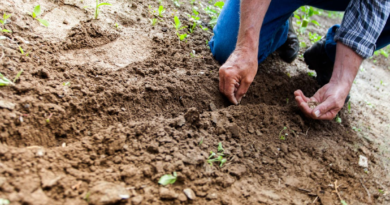Allotments and Mental Health: The Healing Power of Gardening
Allotment gardening has been gaining popularity in recent years as a way to live sustainably and grow fresh produce. However, it is not just the physical benefits of growing your own food that make allotment gardening a worthwhile pursuit. Research has shown that gardening, including allotment gardening, can have a positive impact on mental health.
The Connection between Gardening and Mental Health
Studies have shown that gardening can help to alleviate symptoms of depression, anxiety, and stress. The act of nurturing plants and watching them grow can provide a sense of purpose and achievement. This can help to improve self-esteem and provide a sense of control over one’s life, which is particularly beneficial for those struggling with mental health issues.
Gardening can also provide a sense of calm and relaxation. The physical act of gardening, such as digging, weeding, and planting, can be a meditative experience. Being outside and surrounded by nature can help to reduce stress levels and promote a sense of calmness.
Additionally, gardening can provide social benefits. Allotment gardening, in particular, can provide a sense of community and connection with other gardeners. This can help to reduce feelings of isolation and loneliness, which are common struggles for those with mental health issues.

The Benefits of Allotment Gardening for Mental Health
Allotment gardening has specific benefits that make it particularly beneficial for mental health:
- Physical Activity: Allotment gardening requires physical activity, which is known to improve mental health. Regular exercise has been shown to improve overall mood. Allotment gardening provides a low-impact form of exercise that can be enjoyed by people of all ages and abilities.
- Connection with Nature: Allotment gardening provides an opportunity to connect with nature, which has been shown to have a positive impact on mental health. Exposure to nature has been linked to reduced stress levels, improved mood, and increased cognitive functioning.
- Sense of Purpose: Allotment gardening provides a sense of purpose and accomplishment. Growing your own food can provide a sense of self-sufficiency and pride in your abilities. Additionally, the act of caring for plants and watching them grow can be a fulfilling and rewarding experience.
- Social Connection: Allotment gardening can provide a sense of community and connection with other gardeners. Working alongside others and sharing the fruits of your labor can provide a sense of belonging and social support.
- Mindfulness: Allotment gardening can provide a meditative experience that promotes mindfulness. Being present in the moment, focusing on the task at hand, and observing the natural world can help to reduce stress levels and promote a sense of calmness.
Getting Started with Allotment Gardening
If you are interested in allotment gardening as a form of therapy for mental health, here are some tips to get started:
- Find an Allotment Site: Contact your local council to find out if there are any allotment sites in your area. Many sites have waiting lists, so it is best to get on the list as soon as possible.
- Plan Your Plot: Before you start gardening, plan out your plot. Consider the size of the plot, the types of fruits and vegetables you want to grow, and any other features you want to include, such as a shed or compost bin.
- Start Small: If you are new to gardening, start small. Choose a few easy-to-grow crops, such as tomatoes, lettuce, or herbs, and work your way up to more complex plants.
- Get to Know Your Neighbors: Allotment gardening can be a social activity. Get to know your neighbors and fellow gardeners. Join in on community events and activities.

Allotment gardening is a wonderful way to improve mental health and overall wellbeing. It provides an opportunity to connect with nature, exercise, and grow fresh produce, all of which are known to have positive impacts on mental health.
Research shows that gardening can have a significant impact on mental health, reducing symptoms of depression, anxiety, and stress. Gardening can provide a sense of accomplishment, control, and purpose, which is particularly important for those struggling with mental health issues. Furthermore, being outdoors and surrounded by nature can be a calming and relaxing experience, promoting a sense of calmness and wellbeing.
Allotment gardening has additional benefits beyond traditional gardening. It requires physical activity, which is known to improve mental health, while also providing social connection and community with other gardeners. Allotment sites often have events and workshops that bring gardeners together, promoting a sense of community and reducing feelings of isolation and loneliness.
One of the great things about allotment gardening is that it is accessible to people of all ages and abilities. Whether you are young or old, fit or less mobile, there are ways to participate in allotment gardening that suit your needs. For those with limited mobility, raised beds and container gardening can be great options. And for those who are new to gardening, there are plenty of resources available to help you get started.
Allotment gardening is a fantastic way to improve mental health and overall wellbeing. It provides an opportunity to connect with nature, exercise, and grow fresh produce, all of which are known to have positive impacts on mental health. So if you are looking for a way to promote your mental health, consider allotment gardening as a sustainable and enjoyable option.




